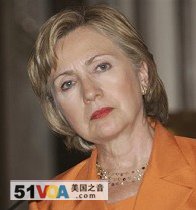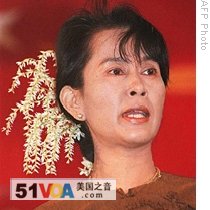Bangkok
21 July 2009
 |
| US Secretary of State Hillary Rodham Clinton listens to questions from reporters during press conference in Bangkok,21 July 2009 |
Clinton said the Obama administration has wide-ranging concerns about the Burma going well beyond the Aung San Suu Kyi case, including army mistreatment of women, repression of minorities, and possible Burmese military cooperation with North Korea.
But as she prepared to join in a dialogue Wednesday with members of ASEAN, including Burma, in the Thai resort island of Phuket, the secretary sounded a conciliatory note, saying the United States is open to a better relationship if the Burmese government deals with those concerns.
"We are willing to have a more productive partnership with Burma, if they take steps that are self-evident - end the violence against their own people, including the minorities that they have focused on the last months, end the mistreatment of Aung San Suu Kyi, end the political prisoners in detention that have been rounded up by the government, and other steps that Burma know it could take," Clinton said.
 |
| Burmese opposition leader Aung San Suu Kyi (file photo) |
Senior administration officials say Clinton has no plans to meet her Burmese counterpart in Phuket, but other members of the U.S. delegation could interact with the Burmese.
The officials said the same applies to North Korea, which is sending a senior diplomat - though not its foreign minister - to the ASEAN dialogue, where more than 20 countries will be represented.
Clinton will have separate bilateral meetings in Phuket with the foreign ministers of China, South Korea, Japan and Russia - the other parties to nuclear negotiations with North Korea - to discuss ways of getting Pyongyang to return to the Chinese-sponsored six-party negotiations.
She said a list of incentives could be offered to North Korea if, and when it rejoined the talks and moved to end its nuclear program, but that there is no evidence of its willingness to do so at this time.
"We think there is a different path for North Korea to follow, that there is an opportunity which is theirs for the taking," Clinton said. "But they have to be willing to change their behavior and agree to de-nuclearize North Korea, which will mean that the entire Korean peninsula is de-nuclearized. And we stand ready to respond if we get any signal that there would be a commitment to doing that."
In her remarks after meeting the Thai prime minister, Clinton referred to the political unrest that has plagued Thailand since a military coup in 2006 and disrupted an ASEAN summit earlier this year.
She said the United States is confident the Thai people can work through the challenges in a way that upholds the country's constitutional principles and democratic traditions, and that they can count on U.S. support as they "pursue reconciliation and find a path forward."